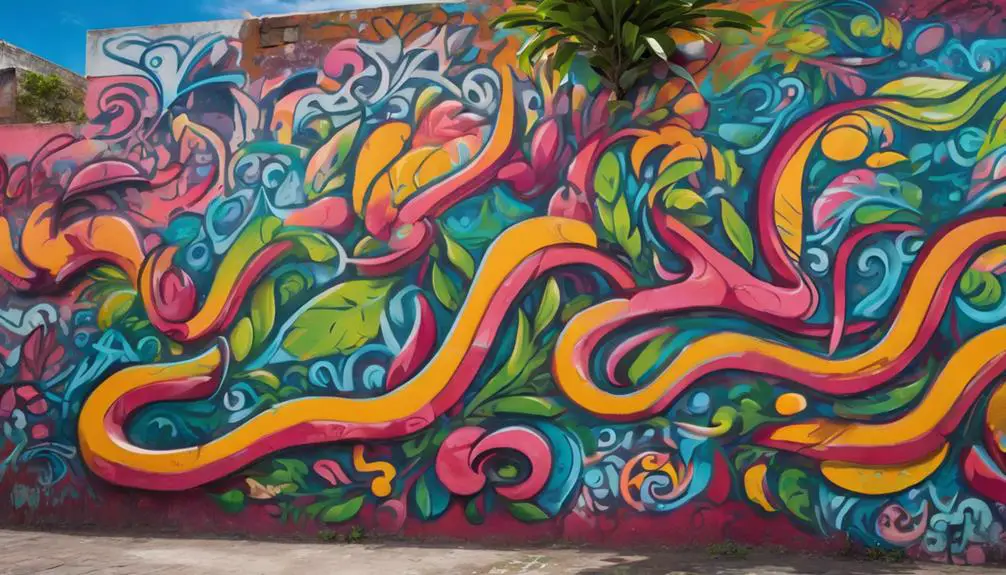You're likely familiar with the widespread use of cocaine in Latin America, where cartels and traffickers have dominated the illegal drug trade for decades. Understanding the various slang terms for cocaine in Spanish-speaking regions can provide valuable insights into the drug culture and help you identify and address drug-related issues more effectively. In Spain, cocaine is commonly known as 'farlopa' and 'nebla', while in Latin America, 'perico' is a popular term. Other slang terms include 'blanca', 'nieve', 'polvo blanco', and 'coca'. As you explore further, you'll uncover more nuances in cocaine slang that can aid in drug prevention and education.
Cocaine Slang in Latin America

In Latin America, cocaine is often referred to as 'perico' in many countries, including Mexico, Colombia, and Peru. You may have heard this term used in conversations or seen it in media, but what does it really mean?
The term 'perico' is deeply rooted in the Cocaine Culture of Latin America, where the drug has a long and complex history. As you explore the Drug History of the region, you'll find that cocaine has been a part of the cultural fabric for centuries.
In the 1970s and 1980s, cocaine became a major player in the illegal drug trade, with cartels and traffickers dominating the market. This led to a rise in cocaine-related crime and violence, shaping the region's Cocaine Culture.
You'll notice that the slang term 'perico' is often used to refer to cocaine in casual conversations, songs, and even in literature. Understanding the context and history behind this term can give you a deeper insight into the complex relationship between cocaine and Latin American society.
Regional Variations in Slang
You'll explore different slang terms for cocaine in various Latin American regions, reflecting local cultural nuances and historical influences that have shaped the drug's presence in each area.
As you investigate the diverse territories, you'll notice that urban dialects and rural nuances greatly impact the slang used to refer to cocaine. In urban centers, you're likely to come across more contemporary and trendy terms, often influenced by popular culture and globalization.
On the other hand, rural areas tend to maintain more traditional and folkloric expressions, often rooted in local customs and oral traditions.
In some regions, you might hear cocaine referred to as 'perico' or 'nevada,' while in others, it's called 'farlopa' or 'piedra.' These variations not only reflect the unique cultural identity of each region but also the complex history of cocaine's presence in Latin America.
As you explore further into the regional variations of cocaine slang, you'll gain a deeper understanding of the complex social and cultural dynamics that have shaped the drug's presence in the region.
Colombian Cocaine Slang Terms

Explore the streets of Colombia, and you're likely to hear cocaine referred to as 'perico' or 'tela'. These terms are deeply ingrained in Colombian dialects and are often used by locals and Cartel members alike. In fact, 'perico' is one of the most common slang terms for cocaine in Colombia, and it's not uncommon to hear it used in casual conversations.
You might also come across 'tela', which is another popular term for cocaine in Colombia. This term is often used in Cartel lingo, and it's a reflection of the country's complex history with drug trafficking. Colombian slang for cocaine is often a reflection of the country's cultural and historical context, and understanding these terms can provide valuable insights into the country's drug culture.
When exploring the streets of Colombia, it's important to be aware of these terms and their connotations. You might hear them used in hushed tones or in casual conversations, but it's crucial to remember that cocaine is a dangerous and illegal substance.
Mexican Cocaine Slang Expressions
Moving south from Colombia, you'll find that Mexico has its own distinct slang expressions for cocaine. As a major transshipment point for cocaine bound for the United States, Mexico's drug cartels have developed their own unique lingo. You'll hear terms like 'perico' or 'nevada' used to refer to cocaine in Cartel lingo. In the Border dialect, cocaine is often referred to as 'toto' or 'coca.'
In Mexico, you may also hear cocaine referred to as 'piedra' or 'piedritas,' which literally translates to 'stone' or 'little stones.' This term is often used by cartel members and drug traffickers to refer to cocaine in a way that avoids detection by law enforcement.
Mexico's drug cartels have developed a sophisticated system of codes and slang to communicate with each other and avoid detection. Understanding these slang expressions can provide valuable insights into the language and culture of Mexico's drug trade. By familiarizing yourself with these terms, you'll gain a better understanding of the complex world of Mexican cocaine trafficking.
Cocaine Nicknames in Spain

In Spain, cocaine is often referred to by nicknames like 'farlopa' or 'nebla', which are used by dealers and users alike to avoid detection by law enforcement. You may also hear terms like 'perico' or 'coca' being used in conversations, especially in areas with high drug activity. These code words are an integral part of Spanish jargon, specifically in the cocaine culture. You'll often find that these terms are explored in depth, especially in public areas, to avoid raising suspicion.
As you investigate further into the world of cocaine in Spain, you'll discover that these nicknames aren't only used by those involved in the drug trade but also by users who want to keep their habits private. Law enforcement agencies are well aware of these code words, but they still pose a challenge in tracking and prosecuting drug-related crimes.
Understanding these terms can provide valuable insight into the cocaine culture in Spain, helping you navigate the complex web of drug-related activities.
Slang Terms in Central America
While traveling through Central America, you'll likely come across slang terms like 'tiznada' or 'nevada' that refer to cocaine in local drug cultures. These terms are often unique to specific regions and dialects.
In Costa Rica, for instance, you might hear 'perico' or 'farlopa' used to describe cocaine. These words are deeply ingrained in the local dialect and are often used in casual conversations.
In Panama, the slang terms take on a different tone. You might hear 'pura' or 'chita' used to refer to cocaine. These terms are often used in Panamanian lingo, reflecting the country's unique cultural influences.
Understanding these regional slang terms can be vital in maneuvering the complex world of drug cultures in Central America. Being aware of these terms is important to avoid misunderstandings or miscommunications.
Understanding Cocaine Code Words

You'll come across cocaine code words in various forms, from cryptic messages to cleverly disguised conversations, which demand a nuanced understanding to decipher their true meaning. In the Cocaine Culture, these code words are an integral part of the Drug Lingo, used to conceal illegal activities and avoid detection.
As you explore further into this world, you'll realize that understanding these code words is vital to exploring the complex web of cocaine-related communication.
You'll encounter code words that seem innocuous at first glance, but hold significant meaning within the cocaine underworld. For instance, 'la piedra' (the stone) might refer to a kilogram of cocaine, while 'el peruano' (the Peruvian) could signify high-quality cocaine from Peru. Other code words might be more abstract, relying on clever wordplay or metaphors to convey their intended meaning.
To crack the code, it's important to stay attuned to the ever-evolving language of cocaine traffickers and users. By recognizing and understanding these code words, you'll gain a deeper insight into the inner workings of the cocaine trade and the culture that surrounds it.
Implications for Drug Prevention
Understanding cocaine code words takes on a new level of significance when you consider their implications for drug prevention efforts. You may think that knowing these code words is only useful for law enforcement, but it's essential for drug education and prevention strategies as well.
When you're aware of the slang terms used to refer to cocaine, you can better identify and address the issue in your community. This knowledge enables you to develop targeted prevention strategies, such as educational programs and outreach initiatives, that effectively reach at-risk populations.
By understanding the language of cocaine users, you can create more effective drug education programs that resonate with your audience. You'll be better equipped to identify and counter drug-related activities, ultimately reducing the demand for cocaine and promoting a healthier, drug-free environment.
Frequently Asked Questions
Is Cocaine Slang Universal Across All Spanish-Speaking Countries?
You might assume that slang terms are universal, but that's not the case. Regional dialects and language barriers create variations in slang across different Spanish-speaking countries.
What's common in Mexico mightn't be understood in Argentina or Spain. Even within countries, regional dialects can vary greatly.
You'll find that slang terms for the same thing can change from one region to another, making it essential to understand local nuances.
Can Cocaine Slang Be Used to Identify Drug Traffickers?
You're on the front lines of a high-stakes investigation, scouring for clues to bring down notorious drug traffickers. Can slang terms for cocaine be the smoking gun that cracks the case? Yes, they can be a valuable tool.
Are There Any Legal Consequences for Using Cocaine Slang?
If you're caught using cocaine slang, you may face legal ramifications. You could be held criminally liable for promoting or facilitating illegal drug activity.
Law enforcement may view your language as evidence of involvement in drug trafficking, leading to criminal charges. Be aware that using cocaine slang can have serious legal consequences, including fines and imprisonment.
It's essential to understand the risks associated with using drug-related language to avoid legal trouble.
How Does Cocaine Slang Evolve Over Time?
As you explore how slang evolves over time, you'll notice it's a reflection of cultural adaptation. Language mutation occurs when words or phrases are altered to convey new meanings or avoid detection. This process is driven by the need for secrecy, creativity, and group identity.
You'll see slang terms emerge, spread, and eventually fade as they become too mainstream or widely recognized. This dynamic process guarantees slang remains a vibrant, adaptive aspect of language.
Can Cocaine Slang Be Used to Educate About Drug Risks?
You're likely to 'bite off more than you can chew' if you think using cocaine slang to educate about drug risks is a straightforward task. However, it's worth exploring.
By leveraging drug slang, you can increase drug literacy and risk awareness among vulnerable populations. By speaking their language, you can convey the harsh realities of cocaine use, making the message more relatable and impactful.
This approach can be particularly effective in schools and community programs.
Conclusion
As you explore the world of cocaine slang, it's evident that the vocabulary is as diverse as the regions themselves. From 'perico' in Colombia to 'coca' in Mexico, each term is a thread in the complex tapestry of drug culture.
But make no mistake, behind these code words lies a dangerous reality. The war on drugs is far from won, and understanding these slang terms is essential in the fight against addiction and organized crime.
The truth is, the devil is in the details, and in this case, the details are written in cocaine slang.







